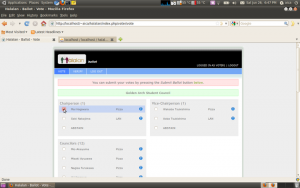Halalan: Difference between revisions
Added screenshot of Halalan |
No edit summary |
||
| Line 18: | Line 18: | ||
Halalan was also used in Botong Isko 2010: an online mock polls for Clean, Transparent, and Honest Elections last . The elections was a mock poll/ survey for the upcoming 2010 National Elections which ran from March 18 to 25, 2010. Only positions in the national-level were included in the elections. Some 48,860 students from the UP System were included in the roster of voters although only 8.10% of those actually participated in the mock polls. | Halalan was also used in Botong Isko 2010: an online mock polls for Clean, Transparent, and Honest Elections last . The elections was a mock poll/ survey for the upcoming 2010 National Elections which ran from March 18 to 25, 2010. Only positions in the national-level were included in the elections. Some 48,860 students from the UP System were included in the roster of voters although only 8.10% of those actually participated in the mock polls. | ||
== | ==Links== | ||
* [http://code.google.com/p/halalan/ Halalan Code Repository] | |||
* [http://halalan.uplug.org/ Halalan Blog] | |||
Revision as of 00:05, 12 August 2011
Halalan is an open-source voting system designed for student elections. It aims to automate the manual processes of elections such as counting, archiving, and voting. It is designed to be easy-to-use and secure. It is currently being developed and maintained by the UP Linux Users Group.[1]

Objectives
- Develop an easy-to-use and secure voting system for student elections to lower their costs and make them run efficiently.
- Prove that the result of a computerized election is valid and trustworthy.
- Increase voters turnout by providing a convenient way to vote.
Elections using Halalan
University-wide UP Student Council Elections
Halalan was deployed in a university-wide scale for the first time during the 2009 University-wide Student Council Elections although it has already been used in college-level elections for the past years. Its deployment in the university-wide scale was a success. Winning candidates for University-wide positions were proclaimed at Vinzons Hall less than an hour after the elections closed.
It was also used in the 2010 University-wide Student Council Elections.
Botong Isko 2010
Halalan was also used in Botong Isko 2010: an online mock polls for Clean, Transparent, and Honest Elections last . The elections was a mock poll/ survey for the upcoming 2010 National Elections which ran from March 18 to 25, 2010. Only positions in the national-level were included in the elections. Some 48,860 students from the UP System were included in the roster of voters although only 8.10% of those actually participated in the mock polls.


